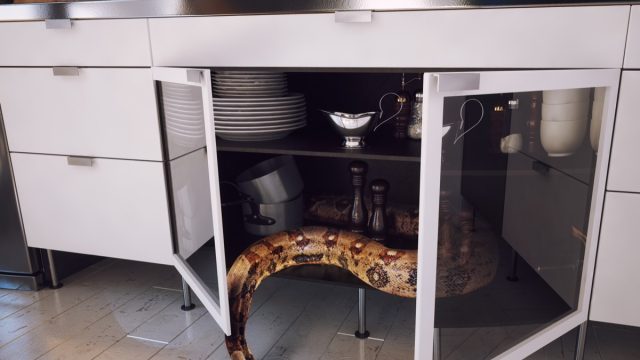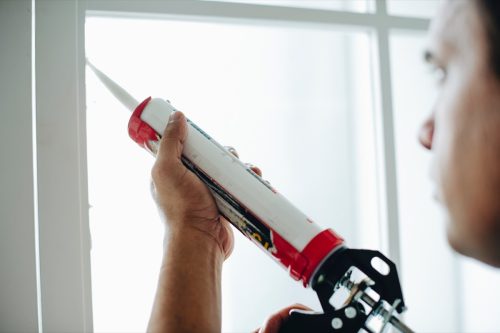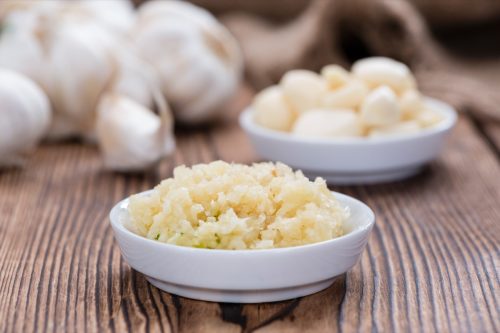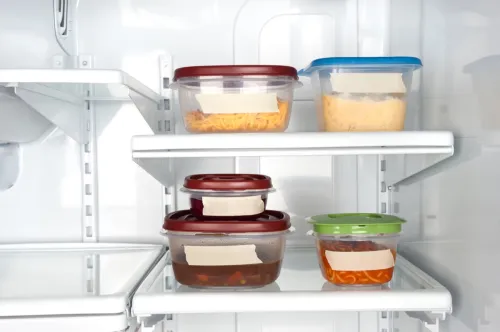6 Ways to Keep Snakes Out of Your Kitchen, According to Experts

Snakes are out and about even more than usual thanks to the warmer temperatures and their goal to find a mate before hibernating in the winter. Since they can slither through almost any area they choose, they may end up in your house—and that could be your attic, your basement, or perhaps even your kitchen. And if they’re hungry, that might be the first place they go to find their next meal. To safeguard your culinary oasis, read on to find out how pest experts say you can keep snakes out of your kitchen.
READ THIS NEXT: 8 Plants That Will Keep Snakes Out of Your Yard, According to Pest Experts.
1
Seal any entry ways.

Snakes can slither through surprisingly small spaces and openings—especially if they’re looking for food. Experts say it’s crucial to seal any areas around doors or windows and to pay special attention to cracks in the walls or floors.
“For sealing, you can use caulk or expanding foam for small cracks, and consider installing door sweeps on doors leading outside,” says A.H. David, a snake expert and founder of Pest Control Weekly.
Nicole Carpenter, CEO at Black Pest Prevention, recommends covering vents and pipes with mesh screens as another way to deny snake access. “This will allow proper ventilation while keeping snakes out,” she says. “Make sure the mesh size is small enough to prevent even the smallest snake from squeezing through.”
2
Use natural repellents.

There’s no need to resort to harmful sprays or powders: You can keep snakes away from your kitchen simply by using scents that they hate—and what’s even better is that these items are already in the kitchen.
Garlic or cinnamon are two easy options. “You only need to crush a few cloves of garlic and place them in the kitchen at some specific points such as cabinets, windows, underneath the sink, etc. because snakes love to hide mostly at these points,” says Izzy Foxx, a zoologist and founder of Wildly Animals.
If you don’t want to leave garlic cloves out (they’re poisonous to dogs and cats), you can make a spray using garlic oil and water to use around various areas of the kitchen, Fox tells Best Life. Or, you can sprinkle ground cinnamon around the perimeter to avoid the garlic stench.
Natural repellents are easy and effective, but David notes that you can also pick some up at any commercial retailer. “Always read and follow the instructions on the product’s packaging and keep in mind that their effectiveness varies and often depends on the type of snake,” he says.
READ THIS NEXT: 8 Things in Your Yard That Are Attracting Snakes to Your Home.
3
Clear out any clutter.

“Snakes are attracted to cluttered areas as they provide hiding spots,” says Mustafa Tshash, co-founder of How To Pets. So, it’s best to keep your kitchen neat and organized to eliminate any possible hideouts.
“Regularly inspect and clean storage areas like cabinets, shelves, and under appliances,” says Carpenter. Don’t overstuff anything and keep containers or dishes stacked nicely.
To stop snakes from getting in your house at all, make sure your yard is also cleared of any debris—wood piles, leaves, and tall plants are all potential hiding spots.
4
Secure any food sources.

While this may seem obvious, it’s not smart to leave food out or have crumbs on your countertop, as it could attract rodents or insects—key ingredients in a snake’s diet.
“Don’t leave food out on counters, and ensure pantry items are sealed,” says David. “This will not only discourage snakes who might be attracted to the smell but also the rodents that snakes prey on.”
For more home and pest advice delivered straight to your inbox, sign up for our daily newsletter.
5
Make sure trash bins are sealed.

Not only are snakes attracted to food, but they can also be attracted to waste, and your kitchen is a hotspot for that. It’s crucial to properly seal and store your trash cans and take them out regularly to avoid pests.
“Use tightly fitting lids and consider storing bins away from the kitchen area to reduce the likelihood of snakes being attracted to them,” says Tshash.
6
Consider getting a pet.

“Cats and certain breeds of dogs are known to be natural predators of snakes and can act as deterrents,” says David.
“It’s also worth noting that not all cats will naturally go after snakes, and some snakes can be dangerous to cats,” says Sabrina Kong, DVM, veterinary consultant at WeLoveDoodles. “It’s a little out-of-the-box and not entirely foolproof, but it does introduce a predator into the mix.”
If you do see a snake in your kitchen, definitely call a professional—getting them out isn’t a DIY opportunity.